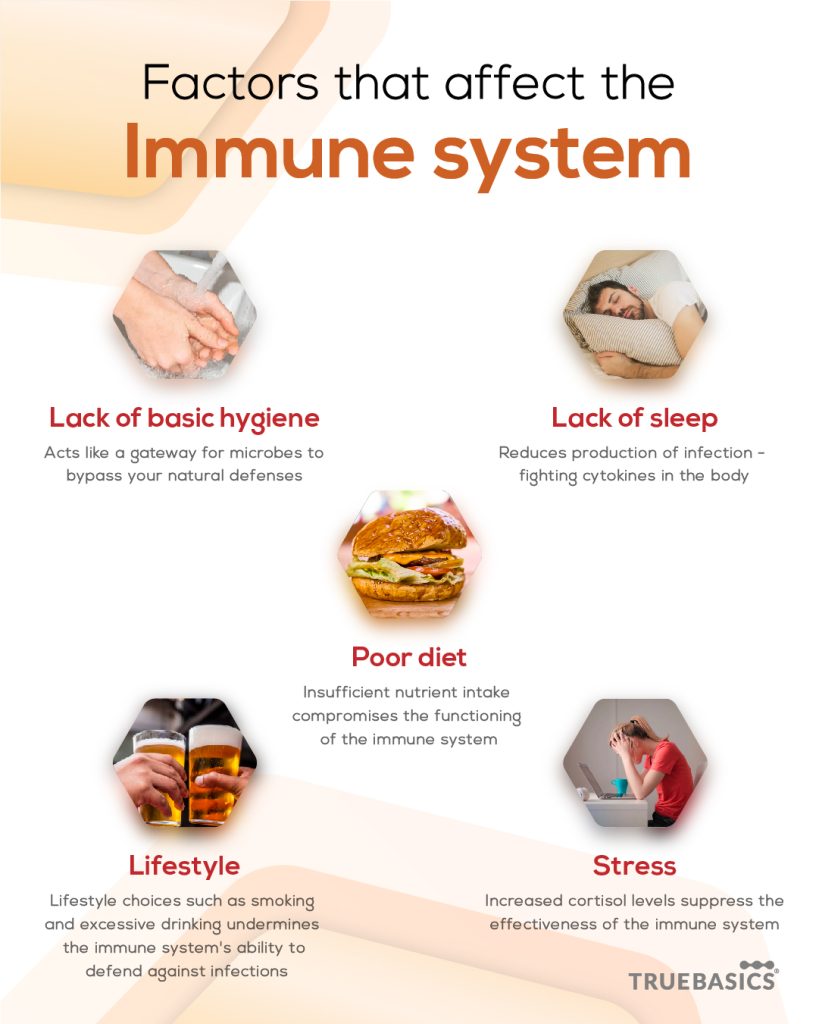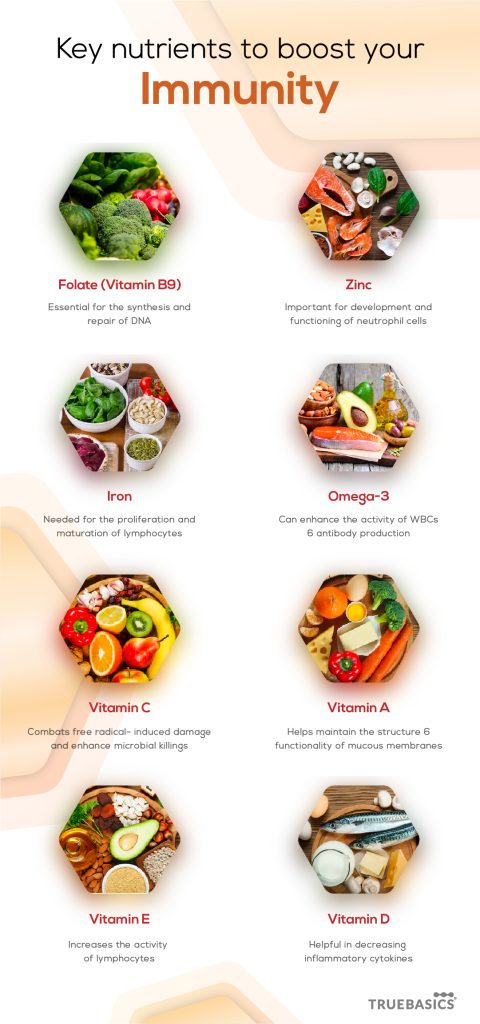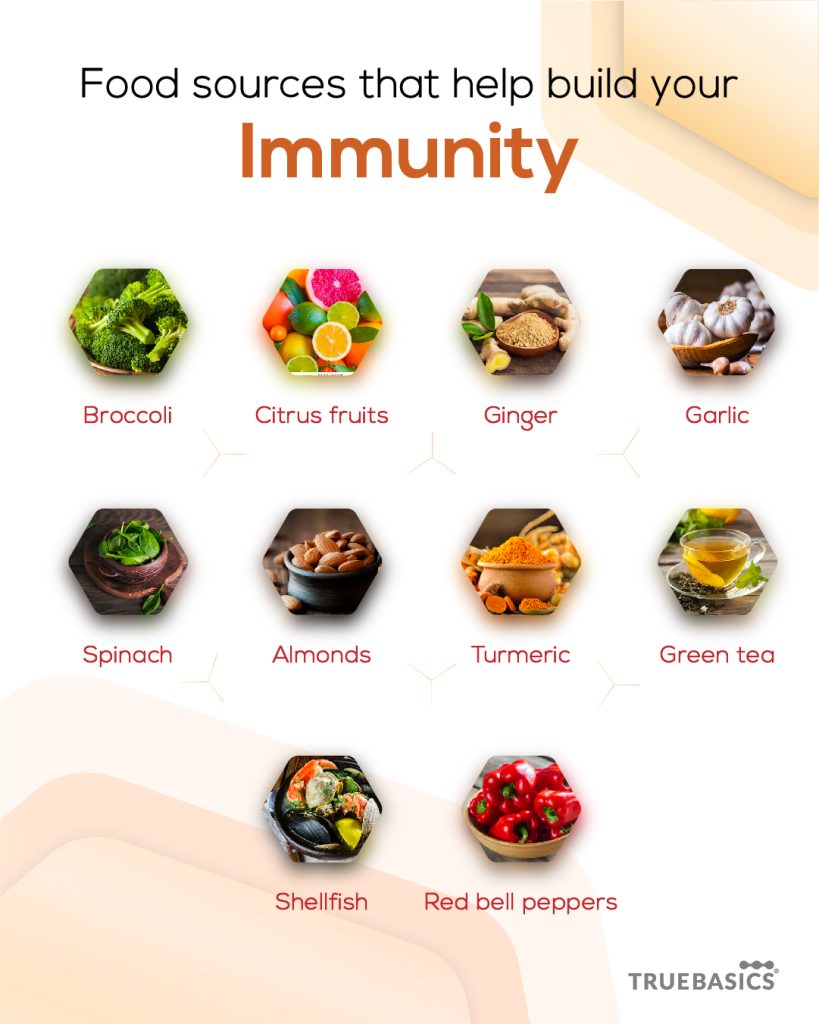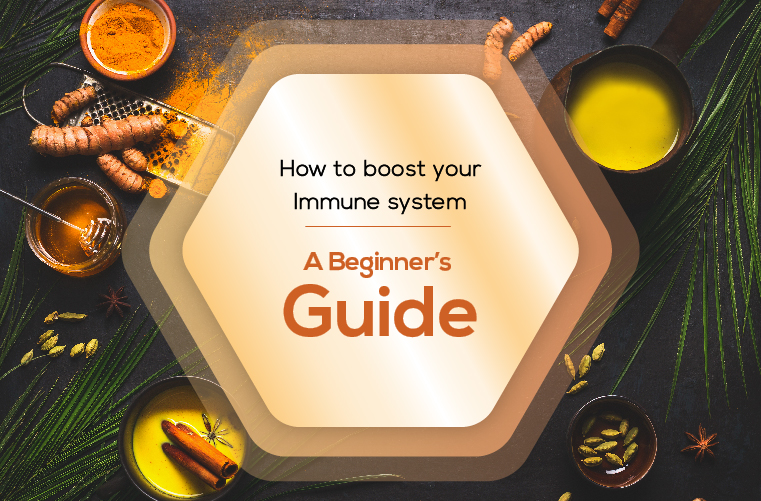The immune system of your body defends your body against viruses, illnesses and infections. But it might not be able to provide this protection at all times if it’s unhealthy and weak. Therefore, it becomes imperative that you take good care of your immune system so that it can look after you. And understanding your immune system is the first step towards boosting it.
What is the immune system?
The immune system is an extremely complex inter-network of tissues, cells, and organs that protects the human body and limits infections from affecting the overall functioning of the body. Infections are a result of microbial actions in the body caused by bacteria, viruses, fungi, and parasites.[1]
The immune system is like a surveillance system, that closely monitors every cell in the human body. It is a robust system that distinguishes between natural inhabitants of your body (healthy cells, natural bacteria) and external immigrants (pathogens, parasites). [2] The invaders are more often a result of foreign bodies entering the human body through multiple routes. They are commonly transmitted through direct contact, touch, inhalation of infected minute droplets from someone else’s sneezes or coughs, a shared needle, or even a bug bite. You might also pick up an infection through contaminated food or water.
Once your immune system senses foreign material in the body, it gears into action initiating multiple simultaneous processes and triggering the release of specialized cells to fight the infection. Once the infection has been neutralized, the immune system resets effectively returning bodily functions to normal. Your body has two major types of immunity to fight the infection – innate and adaptive.
Innate Immune System
The moment you are born, your body is already prepared to repel unfamiliar antigens. This immunity comes from the barrier body parts our immune cells develop into and is called innate immunity.
- Skin and mucosal membranes
Most of these microbes or infections are fended off by the body’s natural first line of defense consisting of a conglomeration of developed cells – the human skin and the mucosal membrane linings in openings like the nose and lungs and respiratory tract . [3] [4]
The innate immune system’s job is to act rapidly upon sensing any foreign material. The human skin secretes antimicrobial proteins called Host Defense Peptides (HDPs) or Antimicrobial Peptides/Proteins (AMPs) [5] that disallow the entry of pathogens, acting as a barricade. In addition to this, the production of mucus and certain acids stave off pathogens before they manage to get a footing [6] [7]. These ‘acids’ may be produced in the form of sweat, urine, or even tears. - Defense cells (Leukocytes) and proteins
If a pathogen somehow manages to make past the first line of defense, a trigger, similar to an alarm, goes off. This initiates a chain reaction with a set of 9 enzymes activating each other in rapid succession, all the while exponentially producing protein substances. The task of these enzymes is comparable to prepping or priming of a system. Their tasks involve:- Tagging pathogens so that scavenger cells can spot them easily [8] [9]. These enzymes mark pathogens so that the cells in our body are identified.
- Dissolving envelopes in case of a virus attack and cell membranes in case of a bacterial infection, in effect draining fluid and minerals of invader cells and ultimately killing them. [10]
- Natural Killer Cells
Natural Killer Cells are the third stage of the functional innate immune system. Natural Killer (NK) cells look for anomalies on the cell surface. The moment they find damaged cells, they kill them by releasing a poison known as cytotoxins. [11] [12]
Adaptive Immunity
Your body develops adaptive immunity in response to antigens your body has not produced yet. These antibodies produced are also received in the womb to stave off potential threats. Your body also develops adaptive immunity after vaccination. Your immune system adapts to the antigens you are exposed to and learns to fend off that type of pathogens for life. Your immune system remembers the pathological action and some antibodies are kept in reserve for future protection against the infection. [13]
The adaptive immune system of the body produces memory cells that remember the antigens that had caused harm to the body. That’s the reason why certain illnesses like chicken pox and roseola happen only once in a lifetime, because the memory cells remember these viruses and the body becomes immune. The first contraction with such a virus lasts only for several days, while the second time, the consequences are either weaker or not at all.
The adaptive immune system had different parts that work differently depending on the location of the pathogens in the body.
- T lymphocytes (T cells) are the white blood cells produced in the bone marrow. They identify the infected cells and help in their destruction and eradication from the body.
- B lymphocytes (B cells) produce antibodies, which are soluble proteins in the blood that are known to work against specific pathogens.
- Cytokines are present in the tissues and blood as the messenger cells that help regulate the immune response.
Importance of a good immune system
A tip in the balance of either can cause a huge tilt shift. A weak immune system will make you powerless against the weakest of pathogens, whereas an overactive one will harm your own body, leading to autoimmune diseases. Although autoimmune systems cannot be rectified naturally, you can aim for a strong immune system in order to have repelled a range of microbes that should ideally not cause infections in healthy individuals [14]. A strong immune system keeps most pathogens at bay, hence allowing for unaltered functioning.
Factors that affect the immune system
Multiple factors can affect the functioning of the immune system, in effect making you vulnerable and susceptible to the commonest of maladies. Some of the most common factors are –
1. Lack of Basic Hygiene
Although the reason seems considerably paltry, it is logical. Lack of basic hygiene like washing hands after using the washroom acts like a gateway for microbes to bypass your natural defenses.[15]
2. Stress
When you’re stressed, your body releases the stress hormone cortisol as a “fight or flight” measure. An unchecked release of cortisol due to chronic stress suppresses the effectiveness of the immune system, pushing it into overdrive and compromising the natural functioning. An overworked immune system is as bad a weak one. [16]
3. Lack of Sleep
While you’re asleep, your immune system produces sleep-promoting proteins called cytokines. Cytokines are also needed by the body to fight infection and inflammation. But when you don’t get enough sleep, the level of protective cytokines decreases, additionally reducing infection-fighting cells and antibodies as well. All this makes you more susceptible to pathogens. [17]
4. Poor Diet
Most of us overlook the fact that diet has a huge impact on the functioning of our body systems and our overall health. Like our body, our immune system also needs key nutrients to produce immune cells, generate an immune response, and produce antibodies. Lack of nutrients like Vitamin C, Vitamin A, Vitamin E, Vitamin B6, Vitamin B12, Iron, and Zinc affects the health of your immune system.
5. Lifestyle Choices
A sedentary lifestyle coupled with unhealthy habits such as excessive drinking and smoking affects the immune system’s ability to defend against infections. Smoking releases toxin chemicals into the system that can affect the functioning of immune cells.

How to Boost your Immune System?
Maintaining a healthy immune system is important for overall wellbeing. Wondering how can you boost your immunity? Dive right in to know some lifestyle changes you can make today to build up your immunity.
1. Eat Nutrient-Rich Balanced Diet
Your body requires certain nutrients on an absolute mandate basis to function properly. When your diet lacks the key nutrients, it compromises the functioning of the immune system and increases the chances of infections and inflammation in the body. Hence, you should focus on consuming a balanced nutrient-rich diet with all the necessary vitamins, minerals and fatty acids.
2. De-Stress Yourself
Stress is one of the reasons behind high cortisol levels that have adverse effects on your immune system. When you’re in stress, your body releases the stress hormone cortisol. High levels of cortisol constantly can lead to a blockage of the immune system and make your body susceptible to possible viruses and bacteria. Relieving stress through various relaxation methods is one way to curb elevated cortisol levels.
3. Exercise Regularly
When your body is in a constant active state, your immune system also remains in a healthy state. Apart from keeping you fit, exercise also helps in the circulation of antibodies and WBCs in blood, decreases inflammation in the body and enhances immune regulation. Exercising also increases the endorphins levels that help in managing stress, which in turn helps boost your immunity.
4. Get Sufficient Sleep
When you’re asleep, your body works even better in fighting inflammation and infections. During your sleep time, your body produces and distributes cytokines that fight inflammation and regulate immune responses. But if you’re sleep deprived, your body will not release these cells and your immune system functioning will get affected. Not getting enough sleep also enhances the cortisol levels that hamper your immune function.[18]
5. Regular Health Checkups
While a regular checkup would not per se increase your immunity, it would make sure that any signs of trouble are diagnosed in advance with appropriate time for action. You should keep in mind that not every symptom (trivial symptoms such as headache, pain, nausea, etc.) of a disease result in a visit to a doctor and not every symptom leaves you with ample time to treat (some sure signs of a disease manifest only when the issue have become severe). A routine checkup at periodic intervals would ensure that such warning signs are detected early and with ample time to take corrective measures.
6. Maintain Good Hygiene
Maintaining basic hygiene is of paramount importance. Clean hands ensure no pathogens lurk around. Therefore, wash your hands with soap and water frequently or sanitize them with alcohol-based solutions. Take bath regularly, wear clean clothes and ensure to keep your home and surroundings clean too.
7. Drink Responsibly
While drinking has become part of everyday lifestyle, studies have shown that binge drinking disrupts our body’s immune pathways. This results in the immune system’s inability to defend against infection and delayed tissue recovery [19]. Excessive drinking also affects the gut balance, which is an important part of immunity, affecting the balance between healthy and unhealthy bacteria. It can also damage the wall of the intestines, allowing bacteria and toxins to leak into the bloodstream [20]. These compounds can then migrate to vital organs such as the liver and cause inflammation, increasing the risk of alcoholic fatty liver diseases.
8. Quit Smoking
Smoking, apart from the harmful effects it has on your lungs, acts as a conduit to multiple infections, ultimately overloading the immune system. Smoking affects both innate and adaptive immunity [21]. Smoking releases chemicals like nicotine, carbon monoxide, nitrogen oxides and many more that hamper with the growth and function of your body’s immune cells [22]. It also worsens any viral infections and infectious disease conditions that you might have like pneumonia, tuberculosis, and flu.
9. Maintain a Healthy Weight
Overweight people are at more risk of developing illnesses and infections. This is because their immune cells fail to adequately respond to viruses and bacteria due to chronic inflammation in the body. Overweight also makes it difficult for the body to circulate nutrients and metabolic hormones. Hence it’s imperative that you watch out for your weight and maintain good health.[23]

Key Nutrients for Boosting Immunity
A balanced diet with key nutrients can help keep the immune system healthy. Include below nutrients to take care of your immunity –
1. Vitamin C
Also known as ascorbic acid, Vitamin C is essential for the maintenance of your immune system. Vitamin C provides an epithelial barrier against pathogens and enhances oxidative scavenging function of the skin, along with microbial killings[24]. Being a powerful antioxidant, it helps in enhancing the skin barriers and aid in wound healing.[25]
2. Vitamin A
Apart from being critical for maintaining vision health, Vitamin A is also important for your immune system. It helps in forming the structure and functionality of mucus membranes that prevent pathogens from entering the body. Vitamin A also supports the growth and distribution of T cells and B cells. [26]
3. Vitamin E
It is a fat-soluble nutrient that protects the cell membranes from free radical damage and increases the activity of lymphocytes (natural killer cells).
4. Vitamin D
Vitamin D is needed by your body to increase the functioning of white blood cells that fight various pathogens. It is also helpful in decreasing inflammation, which in turn improves the body’s immune responses.[27]
5. Vitamin B9
Folate (Vitamin B9) is essential to the production of red and white blood cells in the bone marrow and the production of DNA and RNA.
6. Zinc
Zinc is essential for the regulation of the immune system. It plays an important role in the development and functioning of neutrophil cells that tackle infection and repair damaged tissues, thus aiding in wound healing.
7. Iron
Iron is needed for the proliferation and maturation of lymphocytes, the chief immune cells of your body. [28]
8. Omega-3
Omega-3 has strong anti-inflammatory properties and helps relieve inflammation response in the body. DHA, a type of TrueBasics Omega 3 fatty acids, is known to enhance the activity of white blood cells and antibody production, which helps enhance the immune response by clearing pathogens [29].

Immunity Booster Food Sources
You can include multiple food items to keep your immune system functioning at its optimal level. Go ahead and include the below food sources in your daily diet.
- Broccoli
Broccoli is a super vegetable that has almost everything necessary for a healthy immune system. Loaded with minerals and vitamins, packed with Vitamin A, Vitamin C, Vitamin E, and full of fiber and antioxidants, Broccoli is truly a superfood. It also contains minerals like Zinc and Selenium that help in strengthening the immune defense actions. - Citrus Fruits
Citrus fruits like grapefruits, tangerines, oranges, mandarins, lemons, lime, and clementines are supercharged with Vitamin C, hence aiding in fighting infections. - Ginger
Ginger helps in decreasing inflammation and is packed with antioxidants that combat inflammation and enhance your body’s immune responses. - Garlic
Garlic helps in lowering blood pressure and fighting infections and is known for its immune boosting the heavy concentration of Sulphur-driven compounds like allicin. - Spinach
Spinach is another superfood that has proven effects in boosting immune systems, renowned for its flush of antioxidants, beta carotene, Vitamin C, and Vitamin A. - Almonds
Almonds are supercharged with Vitamin E and are a staple in every healthy eating list. Vitamin E present in almonds is one of the essential antioxidants needed by the body for smooth immune system functioning. - Turmeric
Turmeric is known for its anti-inflammatory properties and muscle damage repairing properties. The main component in turmeric is curcumin that is known to alter immune responses to tackle hypersensitivity reactions and provide faster healing. - Green Tea
Green tea is loaded with antioxidants, especially flavonoids, and the amino acid L-theanine, which aids in the production of germ-fighting compounds in T- cells. - Shellfish
Shellfish contain Zinc and Omega-3 fatty acids, both of which keep the immune system up and running. - Red Bell Peppers
Red bell peppers are known to have twice as much of Vitamin C as citrus fruits and are also a rich source of beta carotene. Apart from boosting your immunity, red bell peppers are also great for your eyes and skin.[30]

In Conclusion…
Your immunity is the defense mechanism of your body against pathogens and infections. Without a healthy immune system to support a body, we are sure to fall prey to the commonest of afflictions. Factors like lack of basic hygiene, insufficient nutrients in the diet, improper sleep, stress, and an unhealthy lifestyle can be the deterrent to having a good immune system. However, with a proper diet and a healthy lifestyle, you can easily maintain a healthy immune system. Make sure you include all the essential nutrients in your daily diet and practice healthy lifestyle habits that boost your immunity and keep you protected always.
Sources:
[1] Nayana Ambardekar. cold-and-flu. https://www.webmd.com. [Online] https://www.webmd.com/cold-and-flu/ss/slideshow-immune-system
[2] Nayana Ambardekar. cold-and-flu. https://www.webmd.com. [Online] https://www.webmd.com/cold-and-flu/ss/slideshow-immune-system
[3] 010. The innate and adaptive immune systems. https://www.ncbi.nlm.nih.gov/. [Online] December 7, 2010. https://www.ncbi.nlm.nih.gov/books/NBK279396/.
[4] Nayana Ambardekar. cold-and-flu. https://www.webmd.com. [Online] https://www.webmd.com/cold-and-flu/ss/slideshow-immune-system.
[5] Harder, J JM SHroder. Antimicrobial peptides in human skin. https://www.ncbi.nlm.nih.gov/. [Online] https://www.ncbi.nlm.nih.gov/pubmed/15976486.
[6] 2010. The innate and adaptive immune systems. https://www.ncbi.nlm.nih.gov/. [Online] December 7, 2010. https://www.ncbi.nlm.nih.gov/books/NBK279396/.
[7] Nayana Ambardekar. cold-and-flu. https://www.webmd.com. [Online] https://www.webmd.com/cold-and-flu/ss/slideshow-immune-system.
[8] Nayana Ambardekar. cold-and-flu. https://www.webmd.com. [Online] https://www.webmd.com/cold-and-flu/ss/slideshow-immune-system.
[9] 2010. The innate and adaptive immune systems. https://www.ncbi.nlm.nih.gov/. [Online] December 7, 2010. https://www.ncbi.nlm.nih.gov/books/NBK279396/.
[10] 2010. The innate and adaptive immune systems. https://www.ncbi.nlm.nih.gov/. [Online] December 7, 2010. https://www.ncbi.nlm.nih.gov/books/NBK279396/.
Nayana Ambardekar. cold-and-flu. https://www.webmd.com. [Online] https://www.webmd.com/cold-and-flu/ss/slideshow-immune-system.
[11] Harder, J JM SHroder. Antimicrobial peptides in human skin. https://www.ncbi.nlm.nih.gov/. [Online] https://www.ncbi.nlm.nih.gov/pubmed/15976486.
[12] 2010. The innate and adaptive immune systems. https://www.ncbi.nlm.nih.gov/. [Online] December 7, 2010. https://www.ncbi.nlm.nih.gov/books/NBK279396/.
[13] Nayana Ambardekar. cold-and-flu. https://www.webmd.com. [Online] https://www.webmd.com/cold-and-flu/ss/slideshow-immune-system.
[14] Overview of the Immune System. https://www.niaid.nih.gov. [Online] https://www.niaid.nih.gov/research/immune-system-overview.
[15] Control CfD. When & How to Wash Your Hands. In: Control CfD, ed. https://www.cdc.gov/handwashing/
[16] “Psychological Stress and the Human ….” https://www.ncbi.nlm.nih.gov/pmc/articles/PMC1361287/. Accessed 27 Mar. 2020.
[17]”Sleep and immune function – NCBI.” 10 Nov. 2011, https://www.ncbi.nlm.nih.gov/pmc/articles/PMC3256323/. Accessed 27 Mar. 2020.
[18] “Sleep and immune function – NCBI.” 10 Nov. 2011, https://www.ncbi.nlm.nih.gov/pmc/articles/PMC3256323/. Accessed 27 Mar. 2020.
[19] Dipak Sarkar, M. Katherine Jung, H. Joe Wang. Alcohol and the Immune System. https://www.ncbi.nlm.nih.go. [Online] https://www.ncbi.nlm.nih.gov/pmc/articles/PMC4590612
[20] https://pubs.niaaa.nih.gov/publications/AA89/AA89.htm
[21] Feifei Qiu, Chun-Ling Liang, Huazhen Liu, Yu-Qun Zeng, Shaozhen Hou, Song Huang, Xiaoping Lai, and Zhenhua Dai1. Impacts of cigarette smoking on immune responsiveness: Up and down or upside down? https://www.ncbi.nlm.nih.gov/. [Online] https://www.ncbi.nlm.nih.gov/pmc/articles/PMC5352117/.
[22] “Impacts of cigarette smoking on immune responsiveness – NCBI.” 25 Nov. 2016, https://www.ncbi.nlm.nih.gov/pmc/articles/PMC5352117/. Accessed 26 Mar. 2020.
[23] “The impact of obesity on the immune response to … – NCBI – NIH.” 14 Mar. 2012, https://www.ncbi.nlm.nih.gov/pubmed/22414338. Accessed 26 Mar. 2020.
[24] “Vitamin C and Immune Function. – NCBI.” 3 Nov. 2017, https://www.ncbi.nlm.nih.gov/pubmed/29099763. Accessed 27 Mar. 2020.
[25] “ascorbic acid supplementation in the treatment of … – The Lancet.” https://www.thelancet.com/journals/lancet/article/PIIS0140-6736(74)91874-1/fulltext. Accessed 27 Mar. 2020.
[26] https://www.ncbi.nlm.nih.gov/pmc/articles/PMC6162863/
[27] “Vitamin D and the Immune System – NCBI ….” https://www.ncbi.nlm.nih.gov/pmc/articles/PMC3166406/. Accessed 26 Mar. 2020.
[28] Silvia Maggii, Adeline Pierre, Philip Calder. Immune Function and Micronutrient Requirements Change over the Life Course. https://www.ncbi.nlm.nih.gov/. [Online] https://www.ncbi.nlm.nih.gov/pmc/articles/PMC6212925/.
[29] “Nothing fishy about it: Fish oil can boost the immune system ….” 1 Apr. 2013, https://www.sciencedaily.com/releases/2013/04/130401111545.htm. Accessed 26 Mar. 2020.
[30] 15 Foods That Boost the Immune System. https://www.healthline.com/. [Online] https://www.healthline.com/health/food-nutrition/foods-that-boost-the-immune-system.













